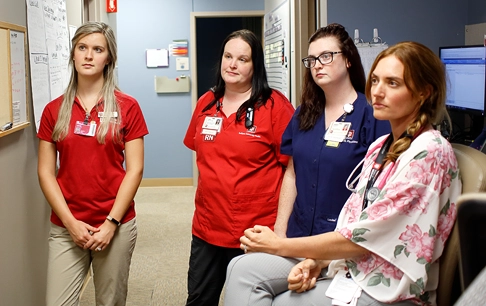Ready to Apply?
Apply Now
Program quick facts
Course Delivery
100% Online
Total Credits
120
Campuses Hosting
- East
- Kokomo
- Northwest
- South Bend
- Southeast
Degree Type
Bachelor of Science
Degree Overview
As a student in the IU Online Bachelor of Science in Applied Health Science, you’ll learn to promote wellness in families and organizations through research, health education, policy making, and health communication. Choose from the community health education or health administration tracks to tailor your degree to your interests.
You’ll benefit from a career-focused program ranked among the best in the nation by U.S. News & World Report. Plus, you’ll enjoy personalized support services throughout your academic journey.
And the benefits start long before graduation. More than half of IU Online students advance in their careers before they complete their degree.
To be accepted to this program, you must have:
- Admission requirements vary.
To apply to this program:
- Complete application for admission.
- Submit official transcripts.
- International applicants may be asked for additional materials.
Application Dates
Rolling admissions. Application review will begin upon receipt of all required application materials.
Upon completion of this program, you may work in a variety of public health, wellness education, and health organization fields, including:
Community Health Educator track
- Wellness coordinator, advocacy coordinator
- Community health worker
- Health educator, health advocate
- Non-profit health agency positions
Health Administration track
- Hospital and health organization administration, nursing home administrator
- Non-profit health agency positions
- Healthcare consultant
- Practice administrator or manager
- Human resources
You can transfer up to 64 credit hours from a regionally accredited community college or 90 credit hours from an accredited four-year university or college.
To graduate with the B.S. in Applied Health Science, you must complete 120 credit hours. Course requirements fall into four categories and are defined by student learning outcomes. Some requirements, such as general education courses, may be met with transfer credits.
Requirements are broken down as follows:
- General education courses (30-42 credit hours)
- Applied health science core courses (42 credit hours)
- Applied health science tracks (18 credit hours)
- Electives (as needed to total 120 credit hours)
| Course Number | Course Name | Credits |
|---|---|---|
| AHSC-H 302 | Essentials of the Healthcare Delivery Systems | 3 Credits |
| AHSC-H 303 | Leadership and Management in Healthcare | 3 Credits |
| AHSC-H 330 | Intercultural Health Communication | 6 Credits |
| AHSC-H 310 | Health Policy, Ethics, and Legal Issues | 6 Credits |
| AHSC-H 360 | Population Health, Epidemiology, and Biostatistics | 6 Credits |
| AHSC-H 340 | Research in Health Sciences | 3 Credits |
| AHSC-H 320 | Consumer Health | 3 Credits |
| AHSC-H 350 | Economics of Healthcare | 3 Credits |
| AHSC-H 370 | Informatics | 3 Credits |
| AHSC-H 480 | Grant Writing and Internship | 6 Credits |
Find course descriptions with our Search Schedule of Classes/Courses tool.
Program cost information
Plan your finances
Program cost can vary by campus, resident status, and type of program. Use the resources below to get accurate cost estimates for your specific situation.
Contact Student Financial Services at iuosfs@iu.edu for cost information.
Find the answers you need or start your application. We’re here to help!


